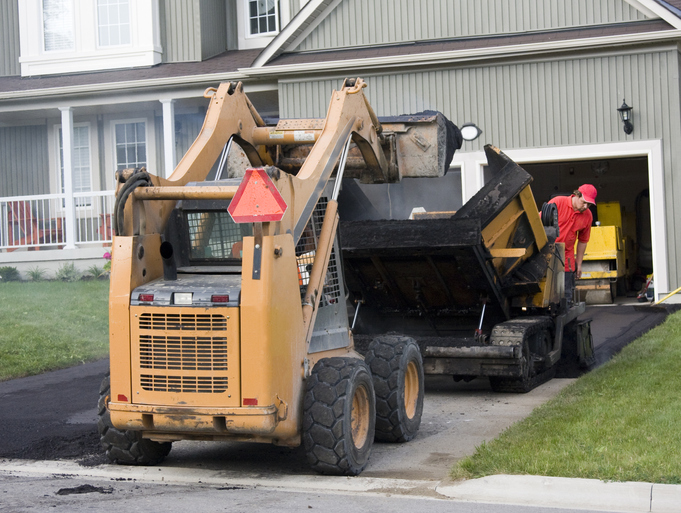Driveways are an essential feature of any property, providing a convenient and functional surface for vehicle access and parking. However, the durability and longevity of driveways can be significantly affected by the presence of heavy vehicles, which can result in pricey fixes from a paving company. Whether it’s delivery trucks, construction equipment, or recreational vehicles, the weight and frequency of heavy vehicles can take a toll on driveways over time.
Learn more about the impact of heavy vehicles on driveway longevity and structural integrity and discuss strategies to mitigate potential damage.
Understanding the Impact of Heavy Vehicles
Heavy vehicles exert substantial force on driveways due to their weight and the distribution of that weight over their tires. Some of the key factors contributing to the impact of heavy vehicles on driveways include:
- Weight: The weight of heavy vehicles can vary significantly, but even smaller commercial vehicles can weigh several tons. This weight puts immense pressure on the driveway surface.
- Tire Load: Heavy vehicles have multiple tires, each bearing a portion of the vehicle’s weight. The load on each tire is concentrated on a small area, increasing the pressure on the driveway surface.
- Frequency of Use: Frequent use of heavy vehicles, such as delivery trucks or construction equipment, can accelerate wear and tear on driveways. Repeated passes over the same areas can lead to compaction and surface damage.
- Type of Pavement: The type of driveway surface also plays a role in its susceptibility to damage from heavy vehicles. Some materials are more resilient than others.
Common Types of Driveway Materials and Their Susceptibility to Heavy Vehicles
The choice of driveway material can significantly impact its ability to withstand the weight and frequency of heavy vehicles. Here are some common driveway materials and their susceptibility to damage:
- Asphalt: Asphalt driveways are durable and can handle the weight of heavy vehicles well. However, they may develop cracks or depressions over time with frequent heavy vehicle use.
- Concrete: Concrete driveways are known for their strength and longevity. They can withstand heavy vehicle traffic better than many other materials, but they may still develop cracks under extreme weight or frequent use.
- Gravel: Gravel driveways are less resilient to heavy vehicles, especially when the gravel is not properly compacted. Heavy vehicles can create ruts and displace gravel, leading to an uneven surface.
- Pavers: Interlocking concrete or brick pavers provide strength and can handle heavy vehicle loads. However, they may shift or settle slightly over time with frequent traffic.
Mitigating the Impact of Heavy Vehicles on Driveways
While it’s challenging to entirely prevent the impact of heavy vehicles on driveways, there are strategies to minimize damage and extend the longevity of your driveway:
- Regular Maintenance: Proper maintenance is key to preserving your driveway. Fill cracks promptly, resurface as needed, and reseal the surface to protect against moisture and wear.
- Reinforced Materials: Consider using reinforced or thicker driveway materials if heavy vehicle traffic is frequent. These materials are designed to withstand more significant weight loads.
- Proper Installation: Ensure that your driveway is installed correctly by professionals who understand the unique demands of heavy vehicle traffic.
- Load Distribution: Distribute the weight of heavy vehicles more evenly by using boards or platforms to spread the load over a larger area when parking or performing tasks.
- Limit Traffic: If possible, limit the use of heavy vehicles on your driveway. This may involve designating specific parking areas or access points away from the driveway.
- Regular Inspection: Regularly inspect your driveway for signs of damage or wear. Catching issues early can prevent them from worsening.
- Consult Professionals: Consult with driveway professionals who can assess your specific situation and recommend suitable materials and maintenance strategies.
Concrete Driveways: A Strong Choice for Heavy Vehicle Traffic
Among the driveway materials available, concrete is often considered one of the best options for withstanding the impact of heavy vehicles. Concrete driveways offer several advantages:
- Strength: Concrete is known for its strength and durability, making it an ideal choice for driveways that experience heavy vehicle traffic.
- Low Maintenance: Concrete driveways require relatively low maintenance compared to some other materials. Regular sealing can help protect against moisture and wear.
- Crack Resistance: While concrete driveways may develop cracks over time, proper installation and maintenance can minimize the risk of significant damage.
- Longevity: Well-constructed concrete driveways can last for decades, even under heavy vehicle use.
Conclusion
Heavy vehicles can have a significant impact on driveway longevity and structural integrity due to their weight and frequency of use and can result in requiring help from a paving company for fixes. The choice of driveway material, regular maintenance, and proper installation are essential factors in mitigating this impact. While some materials, such as concrete, are better suited to heavy vehicle traffic, all driveways can benefit from proactive care and attention. By taking steps to protect and maintain your driveway, you can extend its lifespan and ensure that it continues to provide reliable access and parking for your property, even in the presence of heavy vehicles.

Recent Comments